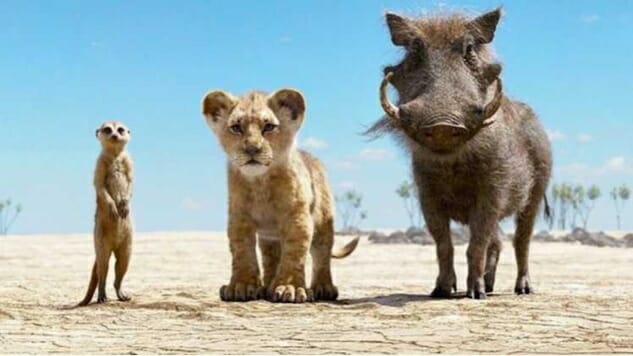The Lion King

1. The Lion King feels less like a more “realistic” version of the classic animated original than a bloodless X-ray of it. The new Disney trend of making “live-action” versions of their animated catalog—“live-action,” of course, being the exact wrong term for what this is—can have a purpose besides the obvious profitability of reviving an existing brand name if its goal is to conjure the spirit of the original rather than artificially reinflate its corpse; David Lowery’s Pete’s Dragon wasn’t perfect, but it felt like a fond cover rather than, well, taxidermy. That’s what the new Lion King feels like: It feels like taxidermy. It feels like computers attempting to impersonate real life and doing so with such rigid, determined accuracy that the result feels both emotionless and even a little ghoulish. What exactly are these creatures?
2. The film starts out well enough, if just because director Jon Favreau has the good sense to simply recreate the wordless sequence that opens the original, the presentation of young Simba to the loyal jungle subjects below. The sequence is the rare one in the film that is both lyrical and realistic, where we see these grand creatures rendered in believable detail, a nature documentary set to music where you can make the animals in the documentary wordlessly move around however you want them to. It’s lovely, and it briefly makes you understand why they might want to make this “life-action” Lion King in the first place. And then the animals start talking.
3. If I may humbly submit a theory that feels so obvious I’m a little embarrassed I have to even say it out loud: An animated dog has a wider range of facial expressions than that of an actual dog. We all know this, right? Animation is animation, after all: You can draw your dog to express whatever you want him to. But when you limit him to what an actual dog can actually do, you take away anything that most spark the imagination. You are not watching a musical number in which a character expresses his or her inner feeling; you are watching an advance Chuck E. Cheese animatronic character movie his pretend mouth around a song that someone else is singing—robot karaoke. All the things you think you can expect from a Lion King movie are there, the classic songs, the Hamlet story structure, the epic vistas of Africa, the wry, almost Zen view of the nature of the world. But they are drained of joy, or vitality. The Lion King proves that you can make it look like an actual, physical lion is singing a song. But why?
-

-

-

-

-

-

-

-

-

-

-

-

-

-

-

-

-

-

-

-

-

-

-

-

-

-

-

-

-

-

-

-

-

-

-

-

-

-

-

-








































